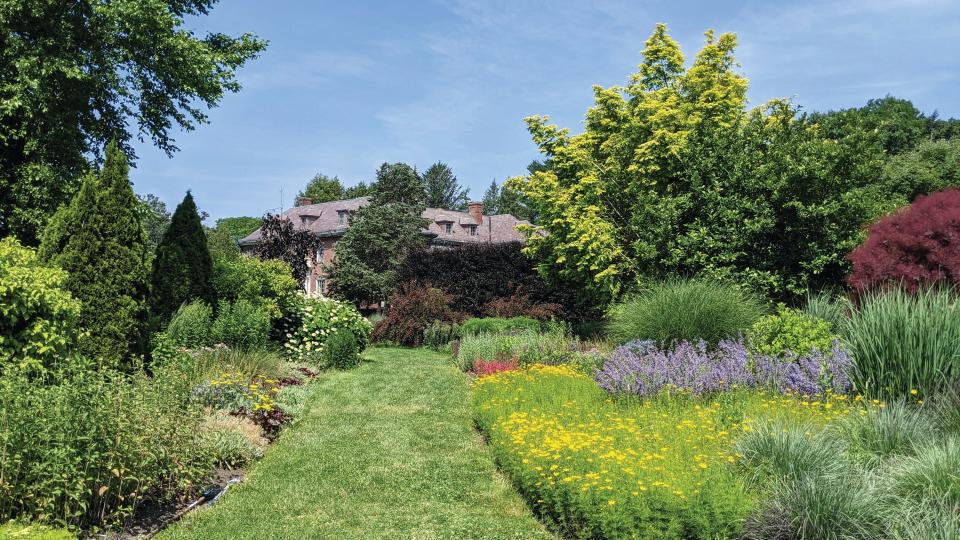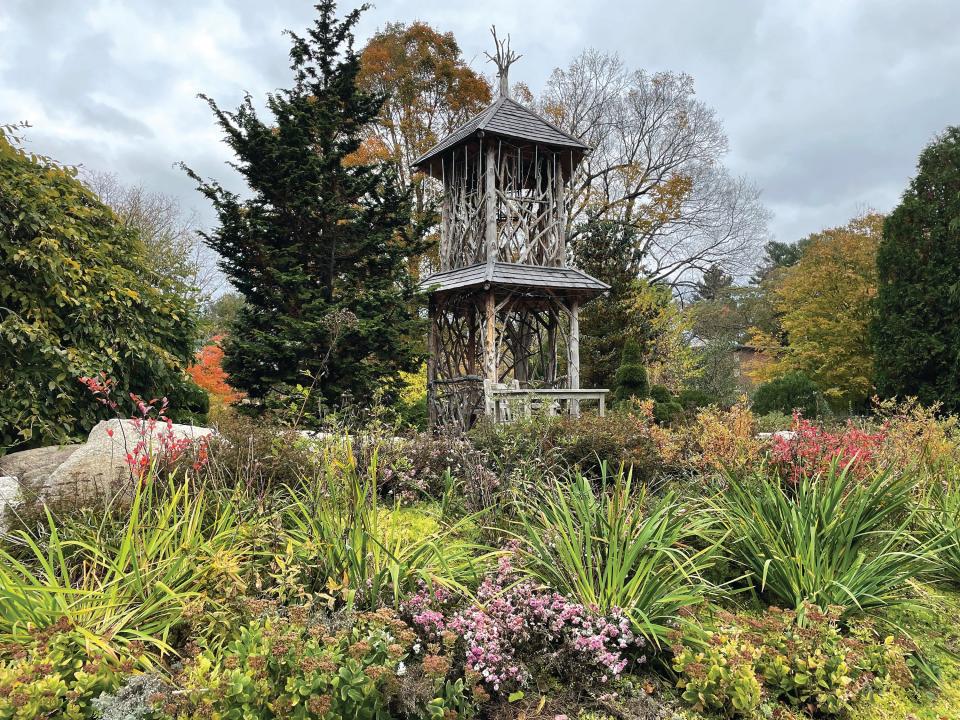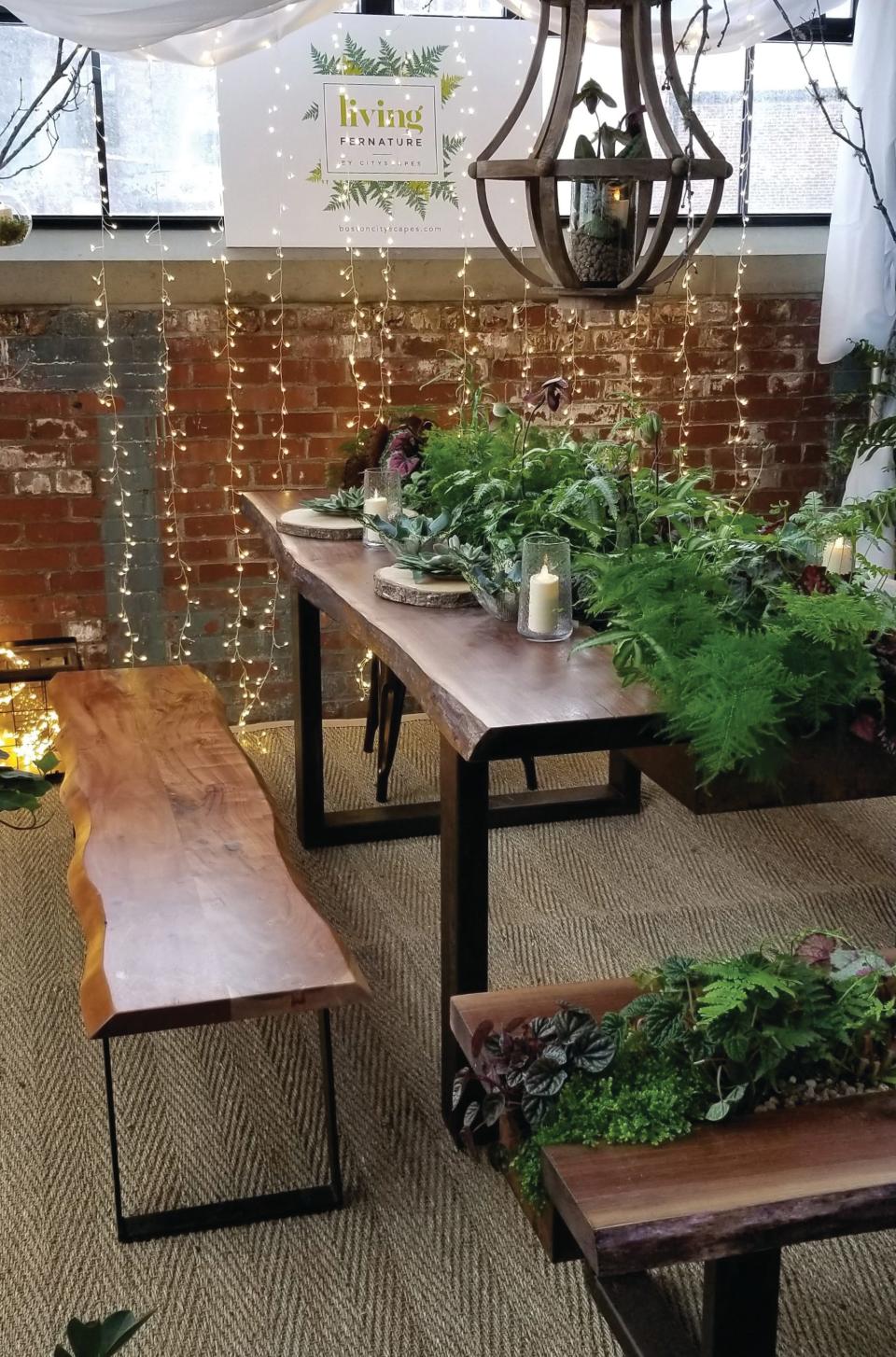Travel&Leisure: Micro Utopia, a preview to outdoor and culinary show

There will be more than colorful flowers in bloom this spring at the Massachusetts Horticultural Society’s headquarters.
In May, as petals on lilacs, irises, tulips, peonies, rhododendrons and leaves on the many beautiful trees emerge, the headquarters of the oldest formally organized horticultural institution in the United States will host a home and garden show at its stately gardens at Elm Bank.
It’s being called Micro Utopia! Rather apt for this lovely place, whose entrance is on Washington Street in Wellesley, but whose property mostly lies in neighboring Dover.
Micro Utopia is a scaled-down preview to the full four-day Utopia: New England’s Premier Outdoor Living & Culinary Show, to give its full billing, which will take place in Boston’s Seaport District at the Flynn Cruiseport’s Black Falcon Terminal in November.

Though a co-sponsor of what is the first Utopia show, MassHort, as it is now trendily and handily known, wasn’t planning on being an actual venue for the show, micro or whatever. But Utopia, which was booked to run at Black Falcon Terminal at the end of March, was abruptly moved to the fall in early February because, well, no prizes for guessing the reason. COVID-19 struck again.
“It’s been a couple of tough years in the event industry,” Utopia’s show director Chuck Carberry said with a dry laugh. Though a horticulturist by training, the Smithfield Rhode Island native’s career path took him into the event industry, which was all but toppled by the COVID-19 shutdowns and restrictions.
“We don’t want to be tone deaf,” Carberry said, speaking from his home in Narragansett, just after the plan for Micro Utopia had been hatched. “We looked at what was going on and decided to move the main event to the fall. A show like this takes so much human effort and interaction, this gives people peace of mind.”

Micro Utopia will be held Mother’s Day weekend in May as an indoor-outdoor event, with an emphasis on the latter. Tiny Homes of New England will display two homes and horticulturists and designers will build out from there, as experts offer talks and demonstrations, all set to inspire.
“The May event will be a preview of the bigger event in the fall,” explained Carberry. “We want to help people create a better home and live more healthily, and give them the tools to do it. You’ll get the essence of it in May, which will promote the big event.”
However, and it’s a big pandemic era however, it’s taken a long time and a big stroke of creative genius to get here and any Utopia happening at all. This is truly the story of pivoting, pivoting, and pivoting some more.
Let’s backtrack all the way to 2019 — a different world, for sure.
That year, Carberry organized the New England Outdoor Living and Garden Show, which took place in Providence, Rhode Island. It was massively successful, but then rebranded under new ownership as Utopia.

The first Utopia should have debuted in Boston in 2020, but we know how that year went.
“The first year was so successful it became obvious we needed a new venue,” said Carberry. “We held it at the WaterFire Arts Center, which is a truly wonderful place. But it was just too small for us. We had already started to grow but then COVID hit, and we hit pause.”
Of course, that came as a big blow as Carberry was on a roll after 2019’s show had garnered massive attendance and vendor interest. He was thrilled to be seeking a bigger venue and moving to Boston for the 2020 show … That was switched to the 2021 show … That was then the big spring 2022 show. Then it wasn’t.
But no sooner was the show moved to fall than this stroke of genius came: a scaled-down event with the Massachusetts Horticultural Society right there at beautiful Elm Bank.
“I hate to sound cliché, but we really did make lemonade out of lemons,” said Carberry, a man of seemingly endless patience and tenacity. “We talked to MassHort and there was no hesitation: They loved the idea. They want to engage with more people and this is a great way to do it.”
“It’s a great fit,” agreed Elaine Lawrence, the Massachusetts Horticultural Society’s director of development. “The beauty of having the micro event here is that we have the perfect venue with outdoor space.”
In return, Elm Bank, often called a hidden gem, gets more exposure: “We want to be less of a hidden gem,” added Lawrence.
This pivot is genius on so many levels: What better time to say hello to new ideas and ideals of living better than spring. And what better place than one with lots of outdoor space and beautiful gardens.
Massachusetts Horticultural Society HQ at Elm Bank occupies a private estate built by Benjamin Pierce Cheney, a railroad magnate and founder of what became the American Express Company.

Coincidentally, Cheney helped found the Massachusetts Horticultural Society in 1829, which was at various times headquartered in various places around Boston, including the building opposite Symphony Hall on Massachusetts Avenue.
Elm Bank was not originally meant to be linked to the society, however; it was simply to be a not-so simple family home. The original house, however, was rebuilt by Cheney’s daughter, who hired Alexander Jackson Davis, the architect behind the New York Public Library, to design the current Georgian mansion. Sadly, it eventually became abandoned and fell into disrepair, and is now unused, and awaiting a massive influx of capital to restore it.
Though the house is unsafe to visit, the outbuildings and gardens stretching over 36 acres abutting the Charles River in Dover are open to the public, spring through fall.
Adjacent to the still handsome mansion, the Italian Garden, designed by the firm of Frederick Law Olmsted, is walled by brick and tall old hedges, and has a central fountain. Nearby, The Goddess Garden boasts statues of Ceres, Flora and Pomona, the Roman goddesses of grain, flowers, and fruit, loom from the shrubbery. The trio originally stood on the pediment of the second Horticultural Society HQ on Tremont Street, occupied until a move to its third headquarters opposite Symphony Hall in 1901.
The goddesses disappeared and were found in a swamp in Beverly. After some restoration, they were installed in this peaceful place.
Where the land rises slightly, the sloped English style Bressingham Garden, which was designed by noted horticulturalist Adrian Bloom and named for his home in England, allows for a natural, less controlled plant bed, something English gardeners favor.
Still, this is a place of manicured nature, artfully tutored by the human hand, and currently also a home to "Seeing the Invisible," an augmented reality art show featuring works from 13 artists from around the world, including Chinese activist Ai Wei Wei’s Gilded Cage. "Seeing the Invisible" runs through August and is an added bonus for Micro Utopia attendees.
Indeed, Micro Utopia is shaping up to be far more than the traditional horticultural show with rows of manmade hybrid plants lined up neatly for judgement; or even home and garden show with random vendors. It is more carefully curated, something Carberry planned for Utopia from the get-go.
“Part of the ethos of Utopia is to live simpler and live healthier,” Carberry explained. “It’s how people want to live now. These tiny homes are set up with gardens for a more holistic way of living. At both events, food, meditation and mixology will be explored — and there will be food trucks. It’s morphed into a festival event,” he said.
While Micro Utopia will have two tiny homes, the main fall event will have about a dozen, all courtesy of Tiny Homes of New England, and all decked out with themed plantings. The fall event will include about 120 vendors, seminars on gardening and plants, and live demonstrations in landscaping, cooking and creating outdoor entertainment setups.
“It all done with the ultimate goal of inspiring our attendees to transform their lives, their outdoor living spaces and take on new hobbies,” said Carberry. “If the pandemic taught us anything, it is the ideal of indoor-outdoor living and how important garden space and nature is to well-being.”
Carberry is excited for the big Utopia, but concentrating fully now on the spring event. Just having a physical embodiment of the long-mooted plans is a relief. He is probably correct in thinking a great day out is something most people will look forward to and that’s the plan for Micro Utopia.
“People can enjoy the beautiful gardens and they can get inspired about living better in their own homes,” said Carberry. “And it’s Mother’s Day weekend, what a great way to spend that.”
Unlike many other shows and events, there was never any serious intention of holding Utopia virtually.
“There was never much thought to going ahead with Utopia as a virtual event during the pandemic shutdowns,” Carberry said. “We had all the groundwork done and we could have done online lectures, but it is too tactile an event to do online. Now people are burnt out on virtual: we’re calling Utopia the anti virtual event,” he added gleefully.
“We’ve been working on the main show for two and a half years,” Carberry said. “We didn’t just pivot. We pivoted four or five times. But I think it’s added more and more to the show each time. Really, the best way to experience it is to walk through the homes and talk to the designers. It’s a lifestyle event.”
But with flowers.
“Yes, but with flowers,” Carberry agreed with a laugh. “A lot of flowers.”
Micro Utopia, a preview to Utopia: New England’s Premier Outdoor Living & Culinary Show, May 6 and 7. Tickets: $20; free to Massachusetts Horticultural Society members and children under 12. The Gardens at Elm Bank, 900 Washington St., Wellesley. masshort.org, utopiaseaport.com
This article originally appeared on Telegram & Gazette: Worcester Living: Micro Utopia, a preview to outdoor and culinary show

